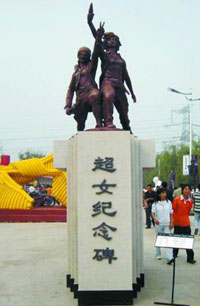|
 |
A statue of 2005 Super Girl Contest winner Li
Yuchun and first runner-up Zhou Bichang stands in a square in
Songzhuang, Tongzhou District, Beijing on October 11, 2006. The work
of two domestic sculptors, the artwork was unveiled on October 6 in
honor of the Songzhuang Culture and Art Festival, which runs until
the 16th. [Beijingtimes]
|
A monument depicting two of China's "Super Girl" pop divas, in a style similar to those of
revolutionary heroes, at a Beijing art festival has caused wide public
debate.
The four-meter-high monument featuring Li Yuchun and Zhou
Bichang, champion and
runner-up of perhaps the country's most successful all-girl singing
contest "Super Girl" in 2005, is on show at the Songzhuang Art Festival in
east Beijing.
The two figures, both leaning forward with one foot striding out,
resemble portrayals of revolutionaries although their rise to fame bears
no such resemblance.
Made in two months by respected sculptors Sun Zhenghua and Dai Yun, the
monument has drawn mass criticism on-line.
Most Internet users argued the "super girls" deserved no such honor.
Other voices also suggest the artists created the sculpture to satirize
the current "super girl" frenzy. A netizen called "Mars Clover" even
shouted out "the world is crazy that Beijing has a 'Super Girl' monument".
The star-making reality show "Super Girl" by central China's Hunan TV
is generally regarded as the Chinese version of American Idol. It drew an
audience of 400 million for the finale of its four-month run in 2005.
But there are also strong voices criticizing "Super Girl" for promoting
"vulgarity", and discouraging youngsters from living life practically by
providing instant celebrity.
Sun, also dean of the Shenzhen Sculpture Institution in South China,
insisted that sculptures do not have to represent revolutionary martyears
but should reflect modern society.
The two "super girls" seemed irritated by the tribute. The agent for Li
Yuchun said her company would take legal action for violations of the
singer's image.
Yu Binghan, agent of Zhou Bichang, expressed a similar view, saying
Zhou was new to the music industry and her performances and social
contributions still fell far
short of being commemorated in
a monument.
Sun Yuanming, a research fellow with the Chongqing Municipal Academy of
Social Sciences, attributed lack of timely laws and regulations to the
emergence of many new things in the society like the
monument.
(Agencies) |